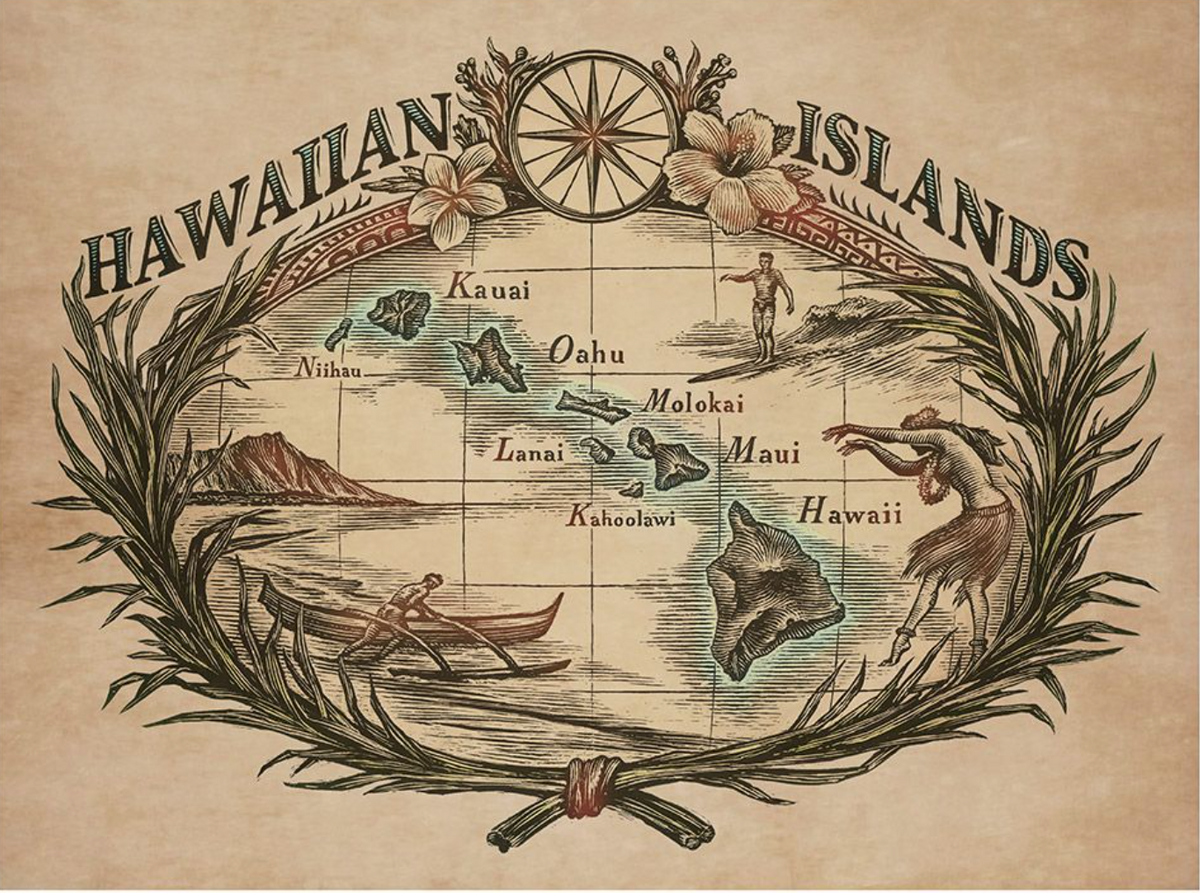Echoes of Aloha: Exploring the Cultural History of the Hawaiian Islands

The Hawaiian Islands, a tropical paradise nestled in the vast Pacific Ocean, have a rich and vibrant cultural history that spans centuries. This history is a tapestry woven with the traditions, beliefs, and stories of the indigenous Hawaiian people. In this blog, we will embark on a journey through time to uncover the cultural history of these enchanting islands.
Ancient Polynesian Voyagers: The First Settlers
The story of Hawaii begins with the courageous Polynesian voyagers who set out in double-hulled canoes, guided only by the stars and their knowledge of the sea. These early settlers arrived in the Hawaiian Islands around 1,500 years ago, bringing with them the foundation of Hawaiian culture. They established a thriving society based on a deep connection to the land and the sea.
Kapu System and Social Structure
Central to ancient Hawaiian society was the Kapu system, a complex set of rules and taboos that governed behavior, land use, and social structure. These rules ensured that resources were managed sustainably, and they played a crucial role in maintaining order in a society where every individual had a specific role and responsibility.
Religion and Spirituality: Worshiping the Elements
The Hawaiians believed in a pantheon of gods and goddesses, each representing various elements of nature. Pele, the goddess of fire and volcanoes, was especially revered, as Hawaii's volcanic landscape was ever-present in their lives. Rituals, chants, and hula dances were integral to their spiritual practices, serving as a way to connect with their gods and honor their ancestors.
Hula: The Heartbeat of Hawaiian Culture
Hula, the traditional Hawaiian dance, is an art form that has transcended time and remains a cornerstone of Hawaiian culture. Originally performed for religious and ceremonial purposes, hula tells stories through graceful movements and chants. It preserves the history, legends, and emotions of the Hawaiian people, ensuring that their heritage is passed down through generations.
Contact with the Western World: A Paradigm Shift
The arrival of Captain James Cook in 1778 marked the beginning of significant changes in Hawaiian society. The introduction of foreign diseases, firearms, and Western goods had a profound impact on the islands. Hawaii's strategic location made it a crucial stopover for whaling ships and a destination for Christian missionaries, further influencing the culture and traditions of the Hawaiian people.
The Kingdom of Hawaii: A Sovereign Nation
Under the leadership of King Kamehameha I, Hawaii was unified into a single kingdom in 1810, ushering in a period of stability and growth. It became a recognized sovereign nation with diplomatic ties to various countries, including the United States and the United Kingdom. During this time, Hawaii flourished culturally and economically.
The End of the Kingdom: Annexation and Statehood
The late 19th century saw a series of political changes that eventually led to the annexation of Hawaii by the United States in 1898. In 1959, Hawaii became the 50th state of the United States. Despite these political shifts, the cultural traditions of Hawaii endured, and the spirit of aloha remained at the heart of the islands.
Preserving the Legacy
Today, the cultural history of the Hawaiian Islands lives on in the music, dance, language, and traditions of the Hawaiian people. The spirit of aloha, with its emphasis on love, respect, and harmony, continues to shape the lives of those who call Hawaii home and those who visit its shores.
Exploring the cultural history of Hawaii is a journey filled with awe-inspiring stories, vibrant traditions, and a deep sense of connection to the land and sea. As we cherish and learn from this rich history, we ensure that the legacy of Hawaii's indigenous culture remains alive and well, echoing through the ages as a testament to the resilience and spirit of the Hawaiian people.
Ancient Polynesian Voyagers: The First Settlers
The story of Hawaii begins with the courageous Polynesian voyagers who set out in double-hulled canoes, guided only by the stars and their knowledge of the sea. These early settlers arrived in the Hawaiian Islands around 1,500 years ago, bringing with them the foundation of Hawaiian culture. They established a thriving society based on a deep connection to the land and the sea.
Kapu System and Social Structure
Central to ancient Hawaiian society was the Kapu system, a complex set of rules and taboos that governed behavior, land use, and social structure. These rules ensured that resources were managed sustainably, and they played a crucial role in maintaining order in a society where every individual had a specific role and responsibility.
Religion and Spirituality: Worshiping the Elements
The Hawaiians believed in a pantheon of gods and goddesses, each representing various elements of nature. Pele, the goddess of fire and volcanoes, was especially revered, as Hawaii's volcanic landscape was ever-present in their lives. Rituals, chants, and hula dances were integral to their spiritual practices, serving as a way to connect with their gods and honor their ancestors.
Hula: The Heartbeat of Hawaiian Culture
Hula, the traditional Hawaiian dance, is an art form that has transcended time and remains a cornerstone of Hawaiian culture. Originally performed for religious and ceremonial purposes, hula tells stories through graceful movements and chants. It preserves the history, legends, and emotions of the Hawaiian people, ensuring that their heritage is passed down through generations.
Contact with the Western World: A Paradigm Shift
The arrival of Captain James Cook in 1778 marked the beginning of significant changes in Hawaiian society. The introduction of foreign diseases, firearms, and Western goods had a profound impact on the islands. Hawaii's strategic location made it a crucial stopover for whaling ships and a destination for Christian missionaries, further influencing the culture and traditions of the Hawaiian people.
The Kingdom of Hawaii: A Sovereign Nation
Under the leadership of King Kamehameha I, Hawaii was unified into a single kingdom in 1810, ushering in a period of stability and growth. It became a recognized sovereign nation with diplomatic ties to various countries, including the United States and the United Kingdom. During this time, Hawaii flourished culturally and economically.
The End of the Kingdom: Annexation and Statehood
The late 19th century saw a series of political changes that eventually led to the annexation of Hawaii by the United States in 1898. In 1959, Hawaii became the 50th state of the United States. Despite these political shifts, the cultural traditions of Hawaii endured, and the spirit of aloha remained at the heart of the islands.
Preserving the Legacy
Today, the cultural history of the Hawaiian Islands lives on in the music, dance, language, and traditions of the Hawaiian people. The spirit of aloha, with its emphasis on love, respect, and harmony, continues to shape the lives of those who call Hawaii home and those who visit its shores.
Exploring the cultural history of Hawaii is a journey filled with awe-inspiring stories, vibrant traditions, and a deep sense of connection to the land and sea. As we cherish and learn from this rich history, we ensure that the legacy of Hawaii's indigenous culture remains alive and well, echoing through the ages as a testament to the resilience and spirit of the Hawaiian people.
